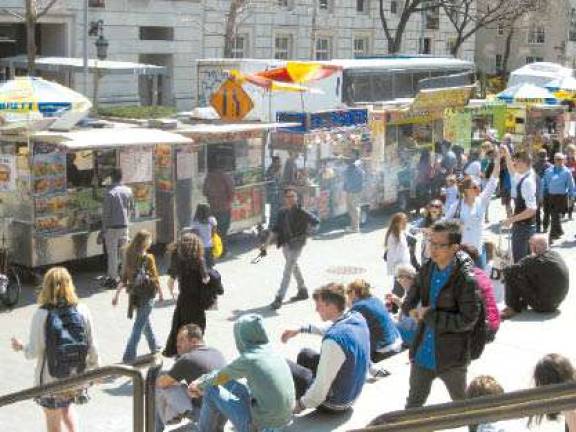Gridlock at the Museum

Vendors have taken over the sidewalks in front of the museum, angering locals and Met officials
Upper East Side For more than a century, tourists visiting the Metropolitan Museum of Art on Fifth Avenue have been greeted by the building's iconic staircase. Now, that view is increasingly crowded out by a crush of food vendors, infuriating everyone from museum staff to the Park Department and the NYPD.
Long lines on a recent sunny day were evidence that the food carts are thriving, although they present such an eyesore and have created so much traffic that tourists and museum donors alike have wondered why the city won't step in to clean the area up. The recent closing of two more tasteful food carts ? a soft-pretzel cart and a high-end cupcake vendor ? has only added to the frustration.
The food gridlock stems from a recent court decision meant to ensure that a veteran-owned hot dog stand could continue to operate legally. Dan Rossi, who served two tours in Vietnam, has operated directly at the foot of the Met for years, fighting against what he's described as an attempt by city officials to marginalize veteran-owned food vendors.
While a judge sided with Rossi, allowing him to remain open, the decision unintentionally opened the floodgates for other businesses hoping to avoid the astronomical cart rents in front of the Met by take advantage of the veteran tax exemption.
Now, people walking along Fifth Avenue can see disabled vets sitting in a long line of lawn chairs behind Nuts 4 Nuts carts and other chain vendors. Those disabled veterans, much to the dismay of Rossi and museum staff, have essentially leased their food vending permits to non ex-military companies in exchange for a reported $100 per day.
"The street vendors who own the carts now own the veterans," Rossi said. "They give them the money for the permit, they put the permit on their cart, and now those veterans have basically become indentured servants."
The practice has created a frenzy in front of the normally idyllic museum, delaying traffic, irking the neighbors, and undercutting the Met's own concessions. Rossi's family has a specialized court order that technically makes them the only business that's legally allowed to sell food at 1000 Fifth Avenue. His family has used that privilege to help fresh-from-the-service men and women transition back into civilian life.
"These vets don't care that they're destroying a legitimate business, all they care about is their $100," he said. "It's disgraceful, they should go to work now that they're got something and can have a livelihood."
Rossi estimated that his profits dwindled to a quarter of the average, as a result of all of the competition.
Worse yet, he says city regulators are refusing to enforce his exclusivity by forcing out the halal carts. If the congestion outside the museum causes enough outrage, the rationale goes, lawmakers would have a better argument when trying to assume more control over veteran-owned food stands and eventually revoke their ability to sell food at all.
Museum staff said that in years past halal carts would try to park alongside Rossi's cart only to be turned away by police within minutes. Most days so far this spring, though, over a dozen carts can be found crowded the curbs around Rossi without any police intervention for hours. The stark contradiction is evidence, Rossi says, that the congestion will only get worse until a court hearing next month is resolved.
"The worse they can make it, the worse it will look for the vets," he said. "It's a pretty low life thing the city is pulling here and my family shouldn't be suffering financially because of it."